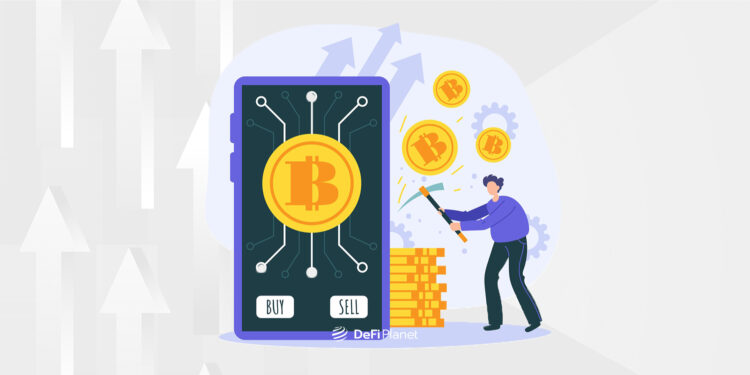Cryptocurrencies can be an attractive investment option, but it’s also more susceptible to scams compared to traditional assets. According to the Federal Trade Commission, crypto scams resulted in losses exceeding $1 billion from January 2021 to June 2022.
One prominent concern within this landscape is the proliferation of fake cryptocurrency apps, which has inflicted substantial financial damage on unsuspecting investors.3 The FBI reported that, in 2022, the average loss incurred due to fake crypto applications stands at a staggering $42.7million. This jaw-dropping figure is a stark reminder of the relentless onslaught of crypto scammers, who stop at nothing to exploit investors across all experience levels.
Although platforms such as Google Play Store and Apple Store rigorously assess app integrity before listing them, some counterfeit apps still manage to evade these safeguards.
Fraudulent crypto app developers employ cunning tactics to deceive unsuspecting users, infiltrating official platforms to distribute their deceptive applications. They often exploit users’ trust in these reputable stores.
This article explores some of these insidious tactics and traps to empower you with the knowledge and vigilance needed to protect your hard-earned investments.
How Do Scammers Trick Crypto Investors?

Fake crypto app scammers employ several tactics to lure in users. Here are some techniques to be cautious of:
- Impersonating Notable Brands
This tactic often leverages the investors’ established trust in a brand to defraud them. The scammer usually presents the app in a way that closely mimics a reputable brand to get the unsuspecting investor to lower their guard.
For example, in 2022, certain fraudsters posed as YiBit employees and defrauded crypto investors of approximately $5.5 million. They convinced victims to download a counterfeit YiBit crypto trading app through which they stole their funds. What these crypto investors didn’t realize is that the authentic YiBit crypto exchange ceased operations in 2018.
These schemes have persisted for an extended period, with many incidents going unreported due to a lack of proper reporting channels, especially in regions where cryptocurrencies are prohibited.
- Social Engineering Schemes
In a social engineering scheme, scammers execute a calculated but bogus program involving several manipulation stages. They begin by identifying potential targets, often scouring social media platforms for individuals interested in cryptocurrencies or financial investments. They also frequent dating sites to establish personal connections with their victims. These initial interactions are designed to create trust and familiarity.
Once a connection is established, the scammers move on to the next phase of their scheme. They skillfully persuade their victims to download fake cryptocurrency apps, cleverly designed to mimic legitimate trading platforms. These apps may appear functional and authentic at first glance, complete with polished interfaces and enticing promises of substantial returns on investments.
However, the true nature of the scam becomes evident when the victim transfers their hard-earned money into the app. At this point, the scammer employs a devious tactic – the funds become ‘locked in,’ and the victim is effectively trapped as they are denied any possibility of making withdrawals or accessing their funds.
For instance, in 2021, a single mother, Hannah, fell victim to a ‘pig butchering’ crypto romance scam through a dating app, resulting in an $80,000 loss.
Some fake crypto app scammers go as far as promising their victims exorbitant returns on their investments, further enticing them. Only after the victims attempt to withdraw their funds or realize the unfulfilled promises do they begin to grasp the extent of the deception. Their funds have become irredeemable, and they are left grappling with the harsh reality of falling victim to a sophisticated crypto scam.
How to Avoid Fake Crypto Apps

To protect yourself from fake wallets and apps, follow these safety precautions before downloading or using any cryptocurrency application or wallet:
Examine Encryption and Security Features:
Ensure that the app you’re considering provides information about its security features. Genuine apps typically highlight features like end-to-end encryption, multi-signature security, and two-factor authentication (2FA). If an app lacks these essential security measures or fails to disclose its security information, it may be a fake.
Check the App’s Reputation in the Crypto Community:
The crypto community often provides valuable insights to spot fake wallets. These communities exist as dedicated forums on online platforms like Reddit and Twitter, where members often share advice and experiences. If a wallet or app isn’t recognized or discussed within these communities, it might be a red flag about its authenticity.
Double-Check for Suspicious Signs:
Before downloading any crypto app, be vigilant and watch out for certain indicators of a fake app:
- Spelling, Icons, and Descriptions: Fake crypto apps often mimic the names and icons of legitimate apps but may contain spelling errors or inaccuracies in their names or developer information.
- Application Permissions: Fake apps may request excessive permissions, aiming to extract more information from your device. Beware of apps seeking unusual permissions, such as device administrator access, as granting these privileges can expose sensitive information necessary to access crypto wallets.
- Number of Downloads: The number of downloads an app has received can be a reliable indicator of its legitimacy. Authentic apps from reputable developers tend to have higher download counts and feature a mix of positive and negative reviews. In contrast, fake apps usually have fewer downloads and limited user feedback.
When in doubt, compare the suspicious app to well-known, trusted wallets and apps found on reputable cryptocurrency exchange sites or trusted tech review platforms. If the suspicious app significantly differs from recognized legitimate wallets regarding developer names, security measures, community recognition, and user feedback, it’s likely a fake.
If you have downloaded a suspicious app, promptly uninstall it, restart your phone, and report it to the app store.
Verify the Developer
Always verify the developer before downloading any cryptocurrency app or wallet. You can usually find this information on the app store or website hosting the app. Look at the developer’s other apps and their reputation in the market.
On Google Play Store, for example, you can confirm an app’s legitimacy by looking for the “Google Editor’s Choice” badge, an accolade awarded to high-quality apps by Google Play.
Review User Feedback
Evaluating user feedback is an effective way to assess the legitimacy of a crypto wallet or app. User reviews often provide valuable insights into the app’s functionality, reliability, and safety. However, exercise caution with overly positive reviews, especially if they are scarce, as they could be fake.
More Protective Measures To Ensure the Security of Devices and Crypto Wallets

Securing your crypto transactions involves more than just avoiding fake wallets and apps; it also requires safeguarding the devices you use. Here are essential steps to enhance your crypto device security:
- Keep Your Devices Updated: Ensure that your devices run the latest software updates. These updates often include critical security enhancements that protect against phishing and hacking attempts.
- Avoid Unverified Links: Never click on unverified links when downloading cryptocurrency wallets or apps. These links may lead to fake applications or install malicious software on your device, putting your crypto and personal information at risk. Taking proper precautions can prevent incidents like the one that happened to Mark Cuban, in which his Bored Ape NFTs got stolen.
Activate Two-Factor Authentication (2FA): Though it is not foolproof, 2FA significantly bolsters the security of your funds, even in the event of a successful login credential phishing attempt. So don’t wait till you suspect a fake app. Implement two-factor authentication (2FA) for your wallet or app. This additional layer of security necessitates a second verification, such as a code sent to your phone, in addition to your password when logging in
- Use Secure Networks: Stick to secure and private networks when conducting cryptocurrency transactions. Avoid using public Wi-Fi for your crypto wallet or app, as it is often insecure and a prime target for hackers.
- Exercise Caution with Personal Data: Share your personal information only when absolutely necessary, whether it’s your full name or phone number. When you must provide such details, ensure it is done over a secure network or application.
- Regularly Backup Your Wallet: Establish a routine for backing up your wallet. This precaution ensures that you won’t lose your cryptocurrency even if your device is lost, stolen, or damaged. Most wallets offer straightforward methods for creating backups, so it is quite easy to get this done.
In this Age of Fake Apps, Your Crypto Asset Security Is Ultimately Your Responsibility
As a cryptocurrency investor, it’s crucial to maintain vigilance and take proactive measures to safeguard your hard-earned assets in a market plagued by the proliferation of fake apps and scams.
To protect your investments effectively, always act by the following guidelines:
- Always scrutinize the authenticity of cryptocurrency apps. Seek recognition within the crypto community, double-check for suspicious signs, and verify developers. Additionally, rely on user feedback and steer clear of unverified links.
- Go beyond app security and ensure the safety of your devices. Keep them up to date, activate two-factor authentication, utilize secure networks, and exercise caution when sharing personal data.
- Regularly back up your wallet to guard against potential losses.
By adhering to these precautions, you can significantly mitigate the risks associated with fake crypto tactics and invest with greater confidence and security.
Disclaimer: This article is intended solely for informational purposes and should not be considered trading or investment advice. Nothing herein should be construed as financial, legal, or tax advice. Trading or investing in cryptocurrencies carries a considerable risk of financial loss. Always conduct due diligence.
If you would like to read more articles (news reports, market analyses) like this, visit DeFi Planet and follow us on Twitter, LinkedIn, Facebook, Instagram, and CoinMarketCap Community.
“Take control of your crypto portfolio with MARKETS PRO, DeFi Planet’s suite of analytics tools.”





















